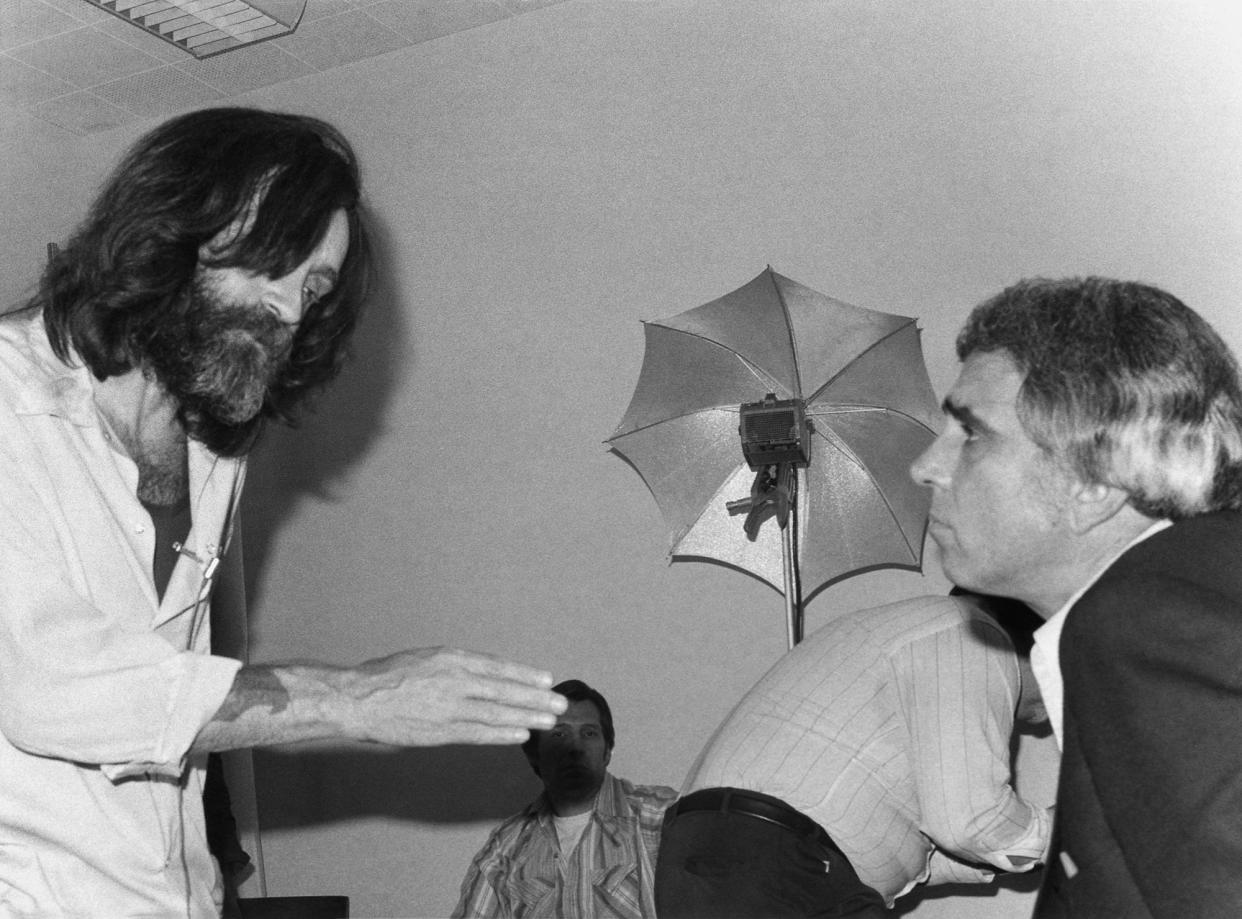Charles Manson in music and books, on TV: The influence of evil

Charles Manson — the vile human who organized a grungy cult that murdered the actress Sharon Tate and four others at her home in 1969 — has died at age 83. Manson was a petty thief and pimp who carved a swastika in his forehead and babbled angrily about a coming race war. Yet he achieved a perverse kind of glory as a pop presence, exerting a pull on numerous musicians, writers, producers, and actors. Scores of TV movies and books have been written about him; his sputtered music career fascinated some famous musicians.
The key to Manson’s infamy is that he committed his most notable crimes in Los Angeles and its environs. In dispatching his so-called “family” of broken-down, brainwashed disciples to a showbiz-posh neighborhood in Benedict Canyon, Manson knew that the house he’d pointed his minions toward had once been occupied by Terry Melcher, a famous Hollywood record producer. Manson blamed Melcher, among others, for the failure of his recording career. Manson had befriended Dennis Wilson of the Beach Boys and played Wilson his songs, hoping the Beach Boy would help him land a music contract. Nothing happened, although Wilson did record a song of Manson’s, “Cease to Exist,” whose title Wilson changed to “Never Learn Not to Love.”
That Manson had rubbed his dirty shoulders with the Hollywood famous brought him instant attention upon his arrest. When he turned out to be a vicious, long-haired psychopath who’d emerged from the dank alleys of San Francisco’s Haight-Ashbury hippie scene, Manson’s place in pop culture might have been predicted. When it was discovered that he referred to a coming apocalypse as “Helter Skelter,” a phrase borrowed from the Beatles, his notoriety was cemented. Musicians such as Marilyn Manson (where do you think Brian Hugh Walter got half of his stage name?) and Guns N’ Roses, looking to tap into a vein of easy evil, recorded Charles Manson songs. Film buffs took notice that the site of the Manson Family compound was Spahn Ranch, which in earlier decades had been the frequent location for movie and TV shoots, especially Westerns: Duel in the Sun as well as episodes of The Lone Ranger and Bonanza were filmed there.
The most famous book about Manson is Helter Skelter, by lawyer Vincent Bugliosi and Curt Gentry. But the better book is The Family, written in 1971 by the poet and journalist Ed Sanders. Subtitled “The Story of Charles Manson’s Dune Buggy Attack Battalion,” Sanders’s book captures the countercultural atmosphere whose idealism could also turn rancid and end up a petri dish for Manson’s nihilism. And the best book of all may be Jeff Guinn’s 2013 Manson: The Life and Times of Charles Manson, scrupulously researched and reported.
On television, Manson became a prime “get” — a much sought-after interviewee for TV personalities ranging from Diane Sawyer to Tom Snyder, whose 1981 session with Manson is creepy stuff indeed.
Manson inspired one entire TV series: Aquarius, a two-season show starring David Duchovny as a cop chasing down Manson (played by Gethin Anthony) along the dusty trail to Spahn Ranch. Numerous TV dramas used Manson, or fictionalized versions of Manson, as subplot-metaphors for wayward youths who fall under the spell of evil seducers. Lost’s Jeremy Davies played Manson in Helter Skelter, a 2004 CBS adaptation of Bugliosi’s book. Manson was also used for comedy: On The Ben Stiller Show in the early 1990s, Bob Odenkirk played the criminal in a recurring segment called “Ask Manson.”
In recent years, attention has turned to some of the women Manson attracted to his cult. The Lifetime movie Manson’s Lost Girls, from 2016, is typical of this subdivision of Manson studies. Manson lore has also received a boost via the current true-crime boom, with podcasts such as You Must Remember This pouring hours of Manson poison into your earbuds.
Does Manson deserve to occupy a place in our minds? Of course not. But his awful crimes, the lives he destroyed, and the sense we try to make of it all continue to reach out to us and won’t allow us to forget him.
Read more from Yahoo Entertainment:


